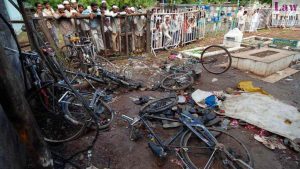By Qalam Times News Network
Synopsis:
All accused in the 2008 Malegaon blast case, including Pragya Thakur and Lt Col Purohit, acquitted by NIA court citing lack of evidence. A 17-year legal battle ends in full discharge.
Blast Case Ends in Acquittal of All Seven Accused

In a dramatic conclusion to the long-running Malegaon blast case, a special NIA court in Mumbai on Thursday acquitted all seven individuals accused in connection with the 2008 explosion that killed six and injured more than 100. The list of acquitted includes former BJP MP Pragya Singh Thakur and Army officer Lt Colonel Prasad Purohit.
The court ruled that the prosecution failed to prove its case beyond reasonable doubt. Special Judge AK Lahoti stated that while the blast was undoubtedly a heinous act, mere suspicion or moral outrage is not sufficient ground for conviction.
‘Terrorism Has No Religion, But Law Needs Proof’
The judge emphasized the principle that justice must be evidence-based, remarking, “There has been a grave incident against society, but courts cannot convict just on moral grounds.”
The verdict effectively shuts the door on a case that became politically and communally charged, especially as it was the first time individuals associated with Hindu nationalist groups were arrested under terrorism charges, prompting the polarizing phrase “Hindu terror.”
The Accused Walk Free
Apart from Pragya Thakur and Purohit, the others acquitted include retired Major Ramesh Upadhyay, Sudhakar Chaturvedi, Ajay Rahirkar, Sudhakar Dhar Dwivedi alias Shankaracharya, and Sameer Kulkarni.
The explosion, caused by an improvised device strapped to a motorcycle (an LML Freedom), occurred on September 29, 2008, during the holy month of Ramzan, in the communally sensitive town of Malegaon in Maharashtra.
Case Timeline and Allegations
Initially investigated by the Maharashtra Anti-Terrorism Squad (ATS) and later transferred to the National Investigation Agency (NIA) in 2011, the case hinged on claims that the accused were members of a fringe group called Abhinav Bharat. According to the ATS, this group allegedly planned the blast as an act of retribution for historical violence against Hindus.

The prosecution had asserted that the motorcycle used belonged to Pragya Thakur and that Purohit had procured the explosives and participated in planning meetings. Both allegations were rejected by the court.
What the Court Found
Judge Lahoti noted several gaps in the prosecution’s evidence. Regarding Purohit, the court said there was “no material to show he brought RDX or had any role in assembling the bomb.” In Thakur’s case, forensic reports failed to conclusively link the damaged vehicle’s chassis number to her ownership.
The court also ruled out the involvement of Abhinav Bharat, stating, “There is no evidence suggesting the group was engaged in any terror-related activity.” Additionally, key witnesses did not support the conspiracy theory outlined by the prosecution.
Interestingly, while the court acknowledged the deaths of six individuals, it cast doubt on the claimed number of injuries—rejecting the prosecution’s figure of 101 injured persons as unsubstantiated.
Compensation and Closure
The court ordered compensation of ₹2 lakh for each of the families of the deceased and ₹50,000 for each injured person.
Reactions from the Acquitted
An emotional Pragya Thakur broke down in front of the media after the verdict, declaring it a triumph for her faith and ideology. “My life was shattered. Today, saffron has won. Hindutva has won. The insult of ‘Bhagwa’ has been answered,” she said.
Lt Colonel Purohit, without naming individuals, called himself a victim of “mentally ill people” who misused power. “I am a soldier. I serve the country with full devotion. Some misused our trust; we endured it,” he stated.
The blast case verdict, while legally binding, is unlikely to end the broader political and ideological debate it has fueled for nearly two decades. What remains now is the reckoning—not in courtrooms, but in public memory and political discourse.








7sfxph
https://shorturl.fm/kzChL
https://shorturl.fm/OQIET
https://shorturl.fm/b5Qdx